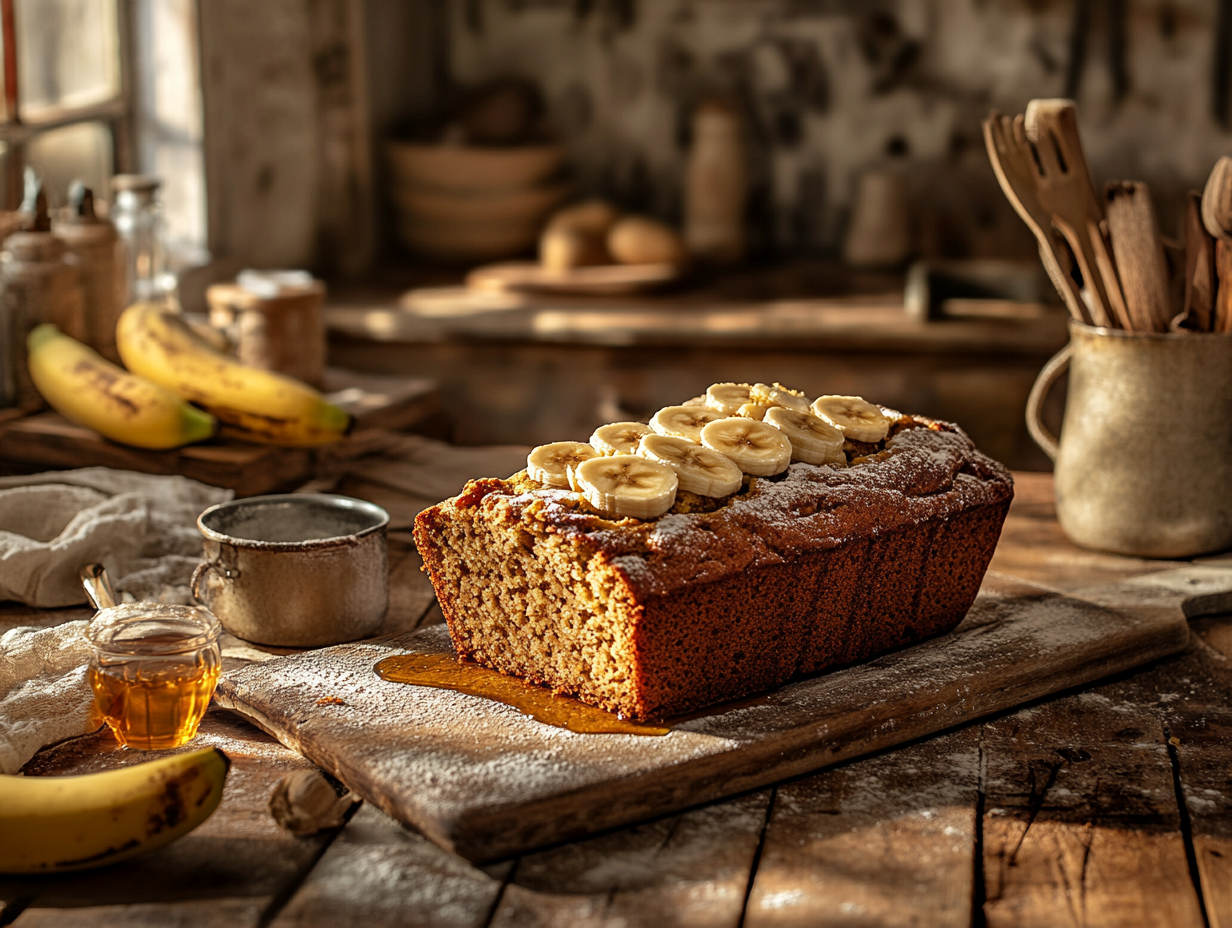Banana bread is a delicious and comforting treat that many people enjoy, but a common question arises: does banana bread contain sugar? Understanding the sugar content in banana bread and its ingredients is crucial for those monitoring their sugar intake or exploring healthier alternatives. In this article, we’ll delve into the various types of sugars commonly found in banana bread and discuss healthier options for your favorite recipes.
Table of contents
The Ingredients of Banana Bread
Traditional banana bread is typically made from a combination of the following ingredients:
- Ripe bananas: These provide natural sweetness and moisture.
- Flour: Usually all-purpose or whole grain.
- Baking soda and baking powder: For leavening.
- Eggs: For binding.
- Butter or oil: For richness and flavor.
- Sugar: Commonly added for extra sweetness.
The role of bananas is significant; as they ripen, they develop more natural sugars, which can reduce the need for additional sugar in the recipe. For more insights on the nutritional benefits of bananas, check out this detailed Healthline article.
When it comes to sugar, traditional banana bread recipes often call for refined sugars, which can raise concerns regarding their impact on health. For instance, many recipes include up to three-quarters of a cup of sugar, adding considerable calories and carbohydrates to each slice Byrdie, Modern Minimalism.
Sugar in Traditional Banana Bread Recipes
The sugar content in banana bread can vary greatly depending on the recipe. A standard slice can contain around 24 grams of sugar when using brown sugar or white sugar, The Novice Chef. Here’s a breakdown of the typical sugar levels you might find:
- Classic Banana Bread: Usually contains refined sugars, which can lead to a higher overall sugar count.
- Healthy Variations: Many recipes substitute traditional sugars with alternatives such as honey or maple syrup.
For those interested in exploring healthier sugar options, resources like Byrdie provide valuable information on sugar substitutes that can enhance your baking without compromising flavor.
Health Implications of Sugar in Banana Bread
Consuming too much sugar can lead to various health issues, such as weight gain, increased blood sugar levels, and even chronic conditions like diabetes. Therefore, it’s essential to consider the type of sugar used in banana bread. Here’s a quick comparison:
- Refined sugars: Found in most traditional recipes, they provide quick energy but lack nutritional benefits.
- Natural sweeteners: Options like honey or coconut sugar not only add sweetness but also provide nutrients and a lower glycemic index Byrdie, The Novice Chef.
Many health experts recommend reducing sugar intake in baked goods, especially when fruits like bananas already provide a natural sweetness.
Alternatives to Sugar in Banana Bread
If you’re looking to reduce sugar in your banana bread without sacrificing taste, consider these alternatives:
- Honey: A natural sweetener that can enhance flavor while lowering glycemic index levels.
- Maple syrup: Adds a unique taste and is less processed than refined sugar.
- Coconut sugar: Retains some nutrients and offers a caramel-like flavor.
Many recipes can be adapted to include these ingredients, allowing you to create a delicious banana bread without the added sugar. For example, you can find a healthy no-added-sugar banana bread recipe on Modern Minimalism, which is a great starting point for anyone looking to bake healthier.
The Role of Ripe Bananas in Sweetness
The ripeness of bananas plays a crucial role in determining the sweetness of banana bread. As bananas ripen, their starches convert to sugars, making them much sweeter and more flavorful. When selecting bananas for baking, look for those that are:
- Speckled and brown: These are ideal for baking as they have the highest sugar content.
- Soft to the touch: Soft bananas will mash easily, resulting in a smooth batter.
Vegan and Gluten-Free Banana Bread Options
For those with dietary restrictions, there are plenty of options available. Vegan and gluten-free banana breads can still be delicious and sweet without traditional sugars. Key considerations include:
- Substituting eggs with flaxseed or chia seed mixtures: These serve as excellent binding agents.
- Using gluten-free flour blends: Almond flour or oat flour can be great alternatives.
These variations often rely more on the natural sweetness of bananas, making them a healthier choice. For tips on gluten-free baking, check out Why Did My Gluten Free Banana Bread Not Rise? For common pitfalls and how to avoid them.
FAQs
Does all banana bread contain sugar?
Not all banana bread contains sugar. Many recipes utilize the natural sweetness of ripe bananas and incorporate healthier sweeteners instead.
Can I make banana bread without added sugar?
Yes, you can make banana bread without added sugar by using ripe bananas and natural sweeteners like honey or maple syrup.
What are the best sugar substitutes for banana bread?
Some of the best sugar substitutes include honey, maple syrup, and coconut sugar, which can enhance flavor while reducing refined sugar intake.
How can I reduce the sugar content in my banana bread recipe?
You can cut down the sugar by using less refined sugar, incorporating more ripe bananas, or choosing natural sweeteners.
Conclusion
In conclusion, while traditional banana bread recipes often contain sugar, there are numerous alternatives and substitutions that can cater to various dietary needs. By exploring different ingredients and understanding the role of sugar in your baking, you can enjoy this classic treat in a healthier way. Additionally, you might find our recipe for Healthy Chocolate Banana Bread with Yogurt helpful for a delicious twist on the classic banana bread while keeping the sugar content in check.
Make sure to check out more delicious recipes on our site to enhance your baking adventures!

